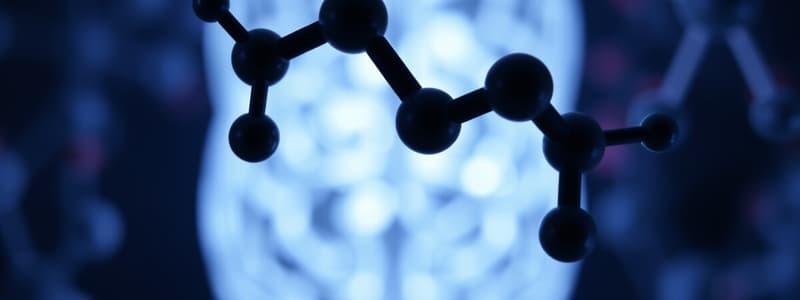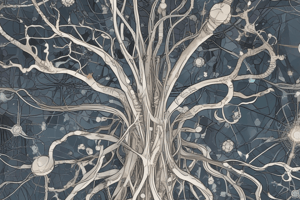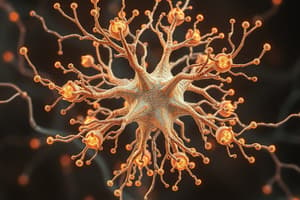Podcast
Questions and Answers
Which of the following criteria must a molecule meet to be classified as a neurotransmitter?
Which of the following criteria must a molecule meet to be classified as a neurotransmitter?
- It must be synthesized and stored in the presynaptic neuron. (correct)
- It must mimic the response of the presynaptic neuron when applied externally. (correct)
- It must be produced in the postsynaptic neuron.
- It must be released only during action potentials.
What are the main classes of neurotransmitters identified in the content?
What are the main classes of neurotransmitters identified in the content?
- Nucleotides, lipids, and carbohydrates
- Amino acids, amines, and peptides (correct)
- Hormones, steroids, and glycoproteins
- Minerals, enzymes, and proteins
Which neurotransmitter was first identified in the studies discussed?
Which neurotransmitter was first identified in the studies discussed?
- Serotonin
- Norepinephrine
- Acetylcholine (correct)
- Dopamine
Which term refers to a neuron that releases acetylcholine?
Which term refers to a neuron that releases acetylcholine?
What distinguishes transmitter-gated ion channels from G-protein-coupled receptors?
What distinguishes transmitter-gated ion channels from G-protein-coupled receptors?
What technique is used to localize molecules to cells using antibodies?
What technique is used to localize molecules to cells using antibodies?
Which method detects mRNA to localize the synthesis of proteins or peptides within a cell?
Which method detects mRNA to localize the synthesis of proteins or peptides within a cell?
What is a necessary condition for a molecule to be considered a neurotransmitter candidate?
What is a necessary condition for a molecule to be considered a neurotransmitter candidate?
Which technique allows researchers to turn on specific synapses for study?
Which technique allows researchers to turn on specific synapses for study?
What type of preparation is commonly used to study neurotransmitter release in vitro?
What type of preparation is commonly used to study neurotransmitter release in vitro?
What role do neurotransmitters play in the nervous system?
What role do neurotransmitters play in the nervous system?
What method is used to assess the postsynaptic actions of neurotransmitters?
What method is used to assess the postsynaptic actions of neurotransmitters?
How do the signaling pathways within a neuron compare to the brain's neural network?
How do the signaling pathways within a neuron compare to the brain's neural network?
Which of the following receptors opens in response to acetylcholine?
Which of the following receptors opens in response to acetylcholine?
What occurs when there is a shift in the balance of signaling power?
What occurs when there is a shift in the balance of signaling power?
What do ligand-binding methods utilize to identify natural receptors?
What do ligand-binding methods utilize to identify natural receptors?
What is a characteristic of the inputs to a signaling network within a neuron?
What is a characteristic of the inputs to a signaling network within a neuron?
What is the composition of GABA receptors in terms of subunits?
What is the composition of GABA receptors in terms of subunits?
What is a recommended strategy for students preparing for their first neuro exam?
What is a recommended strategy for students preparing for their first neuro exam?
According to Dale’s principle, what is a common characteristic of neurons?
According to Dale’s principle, what is a common characteristic of neurons?
Which of the following is considered an exception in the classification of neurotransmitters?
Which of the following is considered an exception in the classification of neurotransmitters?
Which of the following receptor types is NOT associated with transmitter-gated ion channels?
Which of the following receptor types is NOT associated with transmitter-gated ion channels?
What type of analysis is useful for understanding the actions of neurotransmitters, including their agonists and antagonists?
What type of analysis is useful for understanding the actions of neurotransmitters, including their agonists and antagonists?
What describes the 'shortcut' pathway of G-protein-coupled receptors?
What describes the 'shortcut' pathway of G-protein-coupled receptors?
What mechanism allows for signal amplification in G-protein-coupled systems?
What mechanism allows for signal amplification in G-protein-coupled systems?
Which option describes the function of the G-protein in the signaling pathway?
Which option describes the function of the G-protein in the signaling pathway?
What is meant by the term 'divergence' in the context of G-protein-coupled receptors?
What is meant by the term 'divergence' in the context of G-protein-coupled receptors?
How do second messenger cascades differ from the 'shortcut' pathway in G-protein signaling?
How do second messenger cascades differ from the 'shortcut' pathway in G-protein signaling?
What is the role of phosphorylation in G-protein-coupled signaling?
What is the role of phosphorylation in G-protein-coupled signaling?
What does the 'push-pull' method describe in G-protein signaling?
What does the 'push-pull' method describe in G-protein signaling?
What is the significance of 'convergence' in G-protein-coupled receptor systems?
What is the significance of 'convergence' in G-protein-coupled receptor systems?
Which of the following effectively describes the impact of G-protein-coupled receptors on postsynaptic neurons?
Which of the following effectively describes the impact of G-protein-coupled receptors on postsynaptic neurons?
Study Notes
Neurotransmitter Systems Overview
- Neurotransmitters act as chemical keys that bind to receptor locks, facilitating communication within the nervous system.
- Three main classes of neurotransmitters: amino acids, amines, and peptides.
- Each neurotransmitter sends distinct messages, shaping neural communication networks.
Criteria for Identifying Neurotransmitters
- Must be synthesized and stored in the presynaptic neuron.
- Must be released by the presynaptic axon terminal upon stimulation.
- Must mimic the postsynaptic cell response when applied externally.
Experimental Methods for Studying Neurotransmitters
- Immunocytochemistry: Uses antibodies to localize molecules in cells.
- In situ hybridization: Detects mRNA to pinpoint the synthesis of proteins or peptides.
- Microiontophoresis: Applies tiny amounts of neurotransmitters externally to assess postsynaptic effects.
- Microelectrode: Measures changes in membrane potential in response to neurotransmitter application.
Neuropharmacological Analysis
- Uses agonists and antagonists to study neurotransmitter actions.
- Acetylcholine (ACh) receptors include nicotinic and muscarinic types.
- Glutamate receptors include AMPA, NMDA, and kainate types.
Ligand-Binding Techniques
- Identifies natural receptors using radioactive ligands to visualize receptor localization.
- Agonists, antagonists, or chemical neurotransmitters can serve as ligands for studying receptors.
Molecular Analysis of Receptor Classes
- Transmitter-gated ion channels (e.g., GABA receptors) consist of subunits.
- G-protein-coupled receptors initiate complex intracellular signaling pathways.
Evolution of Neurotransmitters
- Neurotransmitters are derived from amino acids, amines, and peptides, with acetylcholine being an exception derived from mitochondrial processes.
Dale’s Principle
- Suggests that a neuron typically releases only one type of neurotransmitter, although there may be exceptions.
G-Protein-Coupled Receptor Systems
- G-proteins link neurotransmitter receptors to downstream effects, influencing cellular responses.
- Two pathways for signaling: a "shortcut" to ion channels, or complex cascades involving second messengers.
- G-proteins can either stimulate or inhibit enzymes like adenylyl cyclase.
Key Mechanisms in G-Protein-Coupled Signaling
- Phosphorylation: The addition or removal of phosphate groups alters protein activity, influencing neurotransmitter effects.
- Signal Amplification: Cascades enhance the strength of signals exponentially.
- Divergence: One neurotransmitter can activate multiple receptor subtypes, increasing postsynaptic responses.
- Convergence: Different neurotransmitters can target the same effector systems.
Importance of Neurotransmitter Systems
- They form the critical links between neurons and effector cells, enabling neurotransmission and signal modulation.
- Understanding signaling pathways helps clarify the complex interplay within the nervous system and informs drug interactions.
Study Recommendations
- Engage with neuroanatomy materials early, as the content requires significant memorization.
- Prepare for assessments combining multiple-choice, true/false, and short answer questions focused on understanding rather than rote memorization.
Studying That Suits You
Use AI to generate personalized quizzes and flashcards to suit your learning preferences.
Description
This quiz covers critical aspects of neurotransmitter systems outlined in Chapter 6. It discusses the criteria that neurotransmitters must meet, experimental methods for studying them, and the main categories of neurotransmitters along with their functions. Additionally, it explores the differences between transmitter-gated ion channels and G-protein-coupled receptors.




